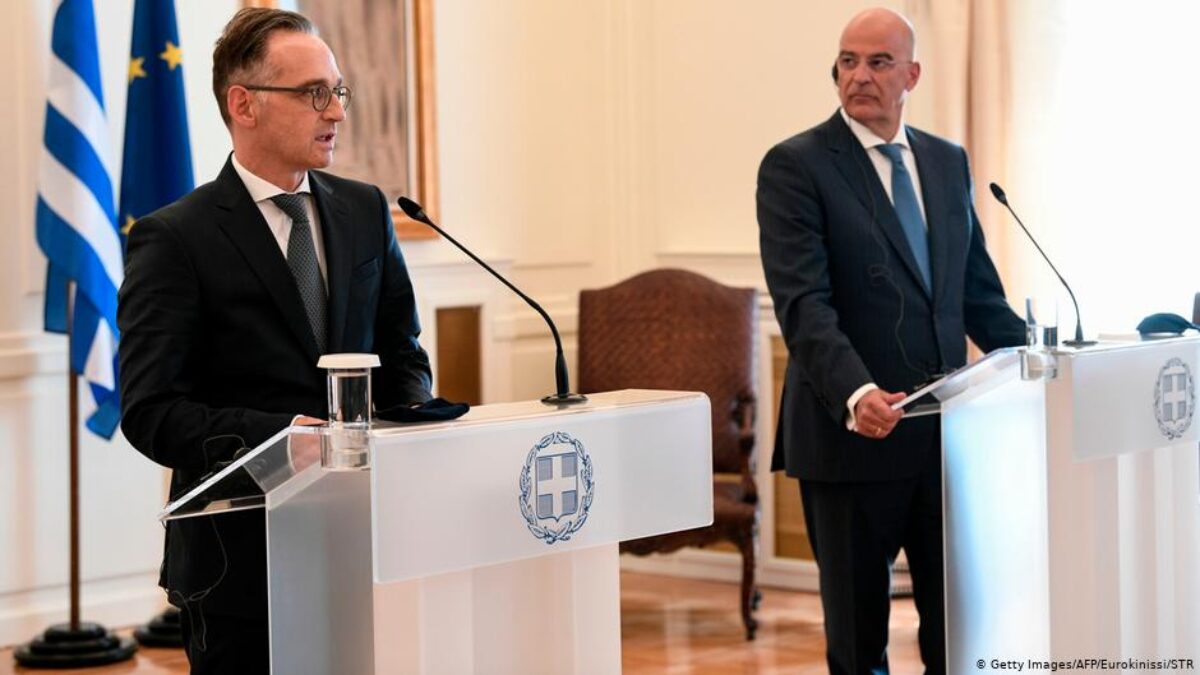Turkey Blame European Countries
“The time of the big guys is over.” Turkey announced on Thursday new military exercise in the eastern Mediterranean and the extension of its research in an area rich in hydrocarbons. A sign of its refusal to give up its standoff with Athens and its supporters, Ankara has also strongly accused France and other European countries of reinforcing tensions by behaving like a “caïd”.
“Shooting exercises” scheduled for September
The Turkish navy also announced Thursday that it would conduct “gunnery exercises” on September 1 and 2 off Iskenderun, in an area north-east of the island of Cyprus. But these maneuvers do not worry Athens, because they take place far from Greece, in an area where Turkey is carrying out “its own exercises”, a Greek military source told AFP.
Faced with this volatile situation, rival military maneuvers “must cease” to allow dialogue between Athens and Ankara, German Foreign Minister Heiko Maas said Thursday. “The parties are not going to sit at the same table as warships face each other” in the region, Haas said at the start of a meeting of European ministers which will continue on Friday.
“Greece is ready for a significant de-escalation provided that Turkey immediately stops its provocative actions”, for his part declared Greek Prime Minister Kyriakos Mitsotakis, who also spoke on Wednesday with the American president by telephone.
Ankara regularly expresses its annoyance about the intervention of European countries, in particular France, and the United States in its dispute with Greece. The dispute over maritime borders between Turkey and Greece is old, but it has taken on another dimension with the discovery, over the past decade, of immense reserves of natural gas in the eastern Mediterranean. The Turkish Defense Minister also accused France on Thursday of contributing to the escalation by deploying warplanes to Cyprus to express support for Athens.
History of disputes
 Turkey and Greece have been in conflict in the Aegean Sea since the mid-1970s, but refrain from unilateral action that could lead to full conflict. They managed to defuse several escalations through diplomacy and dialogue. Of course, US mediation has played a crucial role in maintaining stability. However, adding the eastern Mediterranean to this mix complicates things. Both sides seem to have opened a Pandora’s box.
Turkey and Greece have been in conflict in the Aegean Sea since the mid-1970s, but refrain from unilateral action that could lead to full conflict. They managed to defuse several escalations through diplomacy and dialogue. Of course, US mediation has played a crucial role in maintaining stability. However, adding the eastern Mediterranean to this mix complicates things. Both sides seem to have opened a Pandora’s box.
At first glance, the disagreements are related to the conflicting views of the two countries on the maritime jurisdiction and energy resources of the Eastern Mediterranean. However, the involvement of the EU and countries, including Israel , France , the United Arab Emirates and Egypt (as well as Cyprus ), further complicates the situation. The deterioration of Turkey’s relations with the EU and these countries opens the way for a new alliance against it.
What’s at stake in the eastern Mediterranean?
The discovery of energy resources off the coast of Israel, Cyprus and Egypt increases the potential of the eastern Mediterranean. In particular, the discovery of a large gas field off the coast of Egypt in 2015 increased the likelihood of regional energy exports to Europe. Thus, conflicting claims to sovereignty over the waters of the eastern Mediterranean created a rather tense political climate. With these energy reserves, new regional alliances are emerging. The original agreement between Greece, Cyprus, Italy and Israel on the East-Med gas pipeline has been transformed into a Forum with the participation of Egypt, Jordan and Palestine. But Turkey, Lebanon and Syria were excluded.
Turkey’s choice of “aggressive foreign policy” over the years has damaged its bilateral relations with both Egypt and Israel. Tensions with Western allies have further isolated Turkey in the region. Prior to this, the countries of the region took a balanced position in relation to tensions between Turkey and Greece. However, the US recently lifted a 33-year arms embargo on Cyprus and stepped up military cooperation with Greece, sending Turkey a strong signal of alliances.
To break out of its regional isolation and prevent the Eastern Mediterranean Gas Forum from connecting regional energy resources with Europe through Cyprus and Crete, Turkey has signed a “delineation of maritime jurisdiction” agreement with the UN backed the government of Libya. This agreement allowed Turkey to explore the disputed waters between Cyprus and Crete at the end of July. Prior to that, he mainly focused his maritime activities in the disputed territories around Cyprus, where he overlapped jurisdictional requirements for offshore energy research. But after calls from Germany and Spain, Turkey suspended its activities around Crete.
Ankara is referring to Greece’s decision to declare a site south of the tiny island of Kastelorizo as a naval exercise area. The disputed territory, where the Turkish research vessel Oruç Reis is currently conducting exploration for hydrocarbons, under the protection of warships, is closed for navigation from the evening of 25 to 27 August.
NATO attempts to defuse tensions between Turkey and Greece
This was announced by NATO Secretary General Jens Stoltenberg on September 3. Ankara and Athens have agreed to “enter into technical negotiations with NATO to create deconfliction mechanisms to reduce the risk of incidents and accidents” in the Eastern Mediterranean, where multilateral energy rivalries have exacerbated long-standing territorial disputes between the two neighbours.
The meeting of the Turkish and Greek military delegations, originally scheduled for September 8 at NATO headquarters in Brussels, has been postponed to September 10. Sources in the Turkish Ministry of Defense accused the Greek side of delaying even de-conflict.
The two sides “exchanged views” as part of the discussion on “measures to prevent any potential interference by military elements” during the September 10 meeting, according to a Turkish Defense Ministry statement. The statement said that “a follow-up meeting is planned for the coming days.”
This meeting appeared to have been more of an icebreaker than a real debate, with the deconfliction efforts expected to continue in the form of a series of technical negotiations. But can NATO keep both sides at the negotiating table?
Germany, which has been at the forefront of efforts to defuse tensions in the Eastern Mediterranean, has so far failed to achieve any meaningful results, with German mediation welcomed by Ankara but reluctant by Athens.
Greece believes it is in a strong diplomatic position and has little interest in de-escalation given that Turkey is diplomatically isolated and unable to enlist the support of European Union members. The EU is considering the possibility of imposing sanctions on Turkey if it does not stop unilateral exploration for hydrocarbons in the disputed waters, and the next EU summit is scheduled for early October.
From Ankara’s perspective, the EU can no longer be an impartial mediator.
In the past, the United States has dealt with Turkish-Greek squabbles. During a memorable 1996 crisis in the Aegean Sea, mediation by then President Bill Clinton and then Assistant Secretary of State Richard Holbrooke saved the two neighbours from a military clash over a disputed cluster of islands known as Kardak in Turkish and Imia in Greek. However, today Washington lacks diplomatic clout in the region to play the role of mediator.

